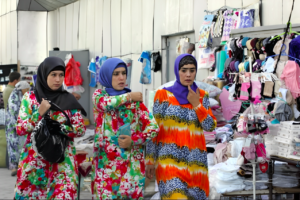Three and a half years after the outbreak of the coronavirus pandemic, Azerbaijan’s land borders remain closed. The personal and economic costs are mounting.
On August 12, ethnic Azerbaijanis living in Georgia released a petition addressed to Azerbaijani president Ilham Aliyev urging him to re-open Azerbaijan’s land borders.
Its organiser, Samira Bairamova, lives in the southern Georgian town of Marneuli and noted that many citizens of both Georgia and Azerbaijan have family living in the other but the border’s closure makes it harder to see loved ones and find work. Over one thousand people have signed the petition so far.
Some 230,000 ethnic Azerbaijanis live in Georgia, making them the country’s largest national minority, around six per cent of the population. Prior to the coronavirus pandemic, many depended on the open border for frequent business and family trips.
Almost three and a half years since the outbreak of the pandemic led international travel to halt in March 2020, Azerbaijan’s land borders remain closed for entry for the stated purpose of reducing the spread of the virus.
However, those entering Azerbaijan by air do not need to provide any proof of vaccination or negative Covid-19 test result, and there are no longer any masking, social distancing, or quarantine requirements within Azerbaijan.
Many Azerbaijanis cannot afford expensive airfare rates, and frustration with the policy is growing.
The personal cost
While Azerbaijan’s border with Armenia has been closed for three decades, prior to the pandemic, its borders had been open with its other neighbours—Georgia, Iran, Russia, and Turkey—all of whom are home to large Azerbaijani populations.
The Azerbaijani exclave of Nakhchivan has a 13-kilometer-long border with Turkey, and while the borders with Georgia, Iran, and Russia have been permanently closed since the start of the pandemic, the border with Turkey has periodically been opened and closed to Azerbaijani nationals.
It was closed in March 2022, re-opened, closed again in July 2022, then re-opened exclusively for Azerbaijani citizens entering Nakhchivan from Turkey and for Nakhchivan residents crossing the border in either direction, but as the borders with Armenia and Iran remain closed, flying is the only way to travel between Nakhchivan and the rest of Azerbaijan.
This has made it very difficult for Azerbaijanis in Turkey to visit their families in Azerbaijan.
Among the almost 60,000 dead in the devastating earthquake that hit Turkey and Syria this February was Shahin Valiyev, a 22-year old Azerbaijani studying in Turkey who was only in that country at the time of the quake because he could not afford to fly home. Shahin’s family home in Ganja, the second-largest city in Azerbaijan after Baku, was destroyed in 2020 by an Armenian strike during the Second Karabakh War, and the family has since struggled financially.
“The death of my child who survived the pandemic and the war happened because he could not return to the country,” Shahin’s mother, Esmira Huseynova, told OC Media. “If the land borders were open, my son would have spent his semester vacation in his own country, like he does every year.”
Shahin would have otherwise taken an affordable bus home to Azerbaijan, but because his last trip to see his family in 2022 cost 600 US dollars due to expensive airfare from a Turkish airport, he was unable to visit in February.
Effects on tourism
While cargo is still permitted entry through Azerbaijan by land, tourists in neighbouring countries are no longer able to transit onwards to the country overland as part of trips through the Caucasus or Caspian Sea regions.
According to World Bank data, the number of international tourist arrivals to Azerbaijan crashed from 3,170,000 in 2019 to 796,000 in 2020, the most recent year for which there is available data.
Even though the border closures have forced many Azerbaijanis who would otherwise holiday abroad in neighbouring countries to vacation domestically instead, there is evidence that the occupancy rate of hotels between January and June of this year was as low as 16.6 per cent—hardly up from 12.4 per cent in the same period of 2022.
In January 2022, the World Health Organisation called on countries to “lift or ease international traffic bans as they do not provide added value and continue to contribute to the economic and social stress,” but this June, Baku confirmed borders would remain closed until at least October. In July, President Ilham Aliyev said that the border closures meant “people do not get sick”.
“The spread of this disease is land borders. That’s why we keep our borders closed. We will keep the borders closed as long as necessary,” he added.
Azerbaijan has much to offer tourists—from the mountain villages of Laza and Xinaliq to Caspian coastline and tea fields of Lankaran—but its potential will remain under exploited as long as its borders remain closed.
And while they do, its families will further suffer.
Source : EMERGING EUROPE











